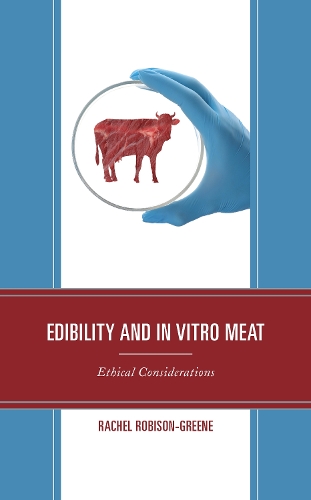
Edibility and In Vitro Meat: Ethical Considerations
(Hardback)
Publishing Details
Edibility and In Vitro Meat: Ethical Considerations
By (Author) Rachel Robison-Greene
Bloomsbury Publishing PLC
Lexington Books
14th November 2022
United States
Classifications
Professional and Scholarly
Non Fiction
Animals and society / Animal rights - issues and debates
Philosophy: aesthetics
641.36
Physical Properties
Hardback
160
Width 162mm, Height 236mm, Spine 19mm
435g
Description
Consumers and policy makers have unprecedented choices to make in the years to come about how and what we eat. If we continue down our current path of food production, we risk ever-increasing levels of animal exploitation, environmental destruction, biodiversity loss, and challenges to human health. In vitro meat production, or the process of growing meat in a lab, has the potential to reduce the severity of these problems. This proposal would change our food systems dramatically. Edibility and In Vitro Meat: Ethical Considerations explores the ethical questions that its important to ask every stage of this process. Rachel Robison-Greene considers arguments for and against the production of in vitro meat, as well as challenges for implementation. She argues that in vitro meat should be implemented and that we should re-think how we use the term edible.
Reviews
Edibility and In Vitro Meat is an excellent book that successfully combines readability with academic rigor. I highly recommend it.
-- "Journal Of Applied Philosophy"Rachel Robison-Greene has written a morally astute, balanced, and unique analysis of the production of in-vitro meat. Her arguments are accessible with a clear understanding of philosophical, cultural, aesthetic, and economic practices of industrialized livestock raising and slaughter. Robison-Greene's text offers a methodical examination of current practices common to confined animal farming, credible interpretations of important thinkers who address the interests of all parties concerned in the production of meat, and a sensible and enlightened view of the future of animal husbandry. The volume concludes with a practical assessment of in-vitro meat production as a response to climate change, human health and cultural concerns, and speciesism. This book will be essential reading for students of ethical human-animal interactions, non-human animal welfare and rights, and is highly recommended for students of animal studies, environmental studies, and food systems in general.
--Karen Mizell, Utah Valley UniversityAuthor Bio
Rachel Robison-Greene is assistant professor of philosophy at Utah State University.
